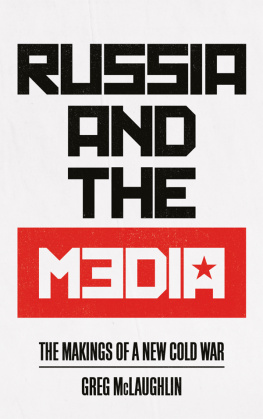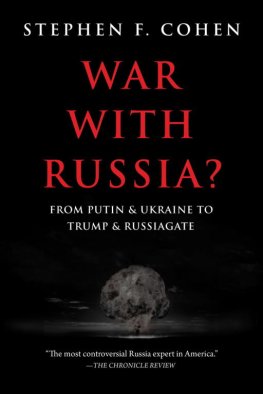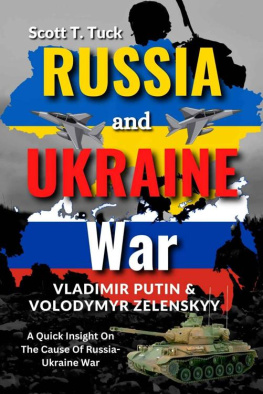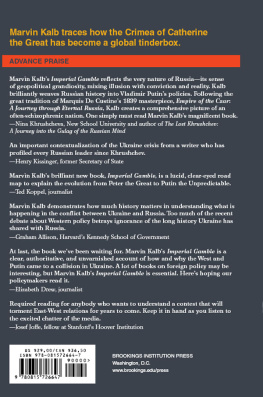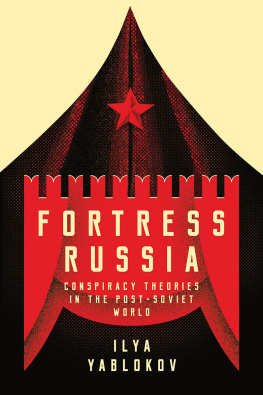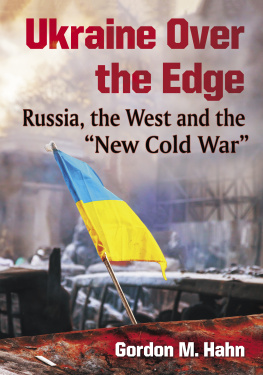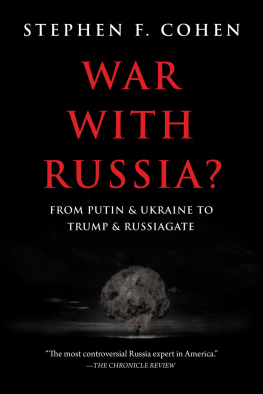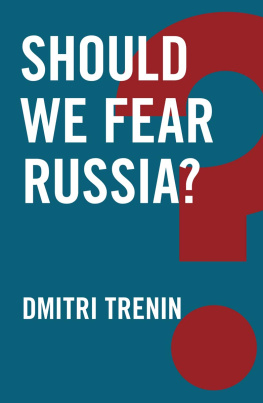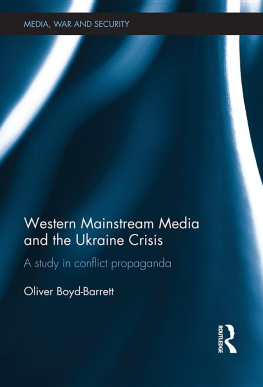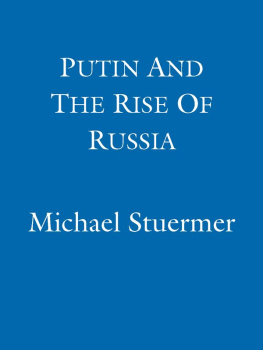Contents
Guide
Russia and the Media
Russia and the Media
The Makings of a New Cold War
Greg McLaughlin

First published 2020 by Pluto Press
345 Archway Road, London N6 5AA
www.plutobooks.com
Copyright Greg McLaughlin 2020
Di Eagle an Di Bear by Linton Kwesi Johnson LKJ Records Ltd/LKJ Music
Publishers Ltd; reproduced by permission.
The right of Greg McLaughlin to be identified as the author of this work has been asserted by him in accordance with the Copyright, Designs and Patents Act 1988.
British Library Cataloguing in Publication Data
A catalogue record for this book is available from the British Library
ISBN 978 0 7453 3767 8 Hardback
ISBN 978 0 7453 3765 4 Paperback
ISBN 978 1 7868 0523 2 PDF eBook
ISBN 978 1 7868 0525 6 Kindle eBook
ISBN 978 1 7868 0524 9 EPUB eBook
This book is printed on paper suitable for recycling and made from fully managed and sustained forest sources. Logging, pulping and manufacturing processes are expected to conform to the environmental standards of the country of origin.
Typeset by Stanford DTP Services, Northampton, England
Simultaneously printed in the United Kingdom and United States of America
To my Sue with love
And in memory of my Mum, Maureen (19302017)
Contents
Acknowledgements
I want to offer my warm thanks and appreciation here to the people who helped me see this book through to completion and into production.
At Pluto Press, commissioning editor, David Castle, for his priceless patience and wise counsel, especially during personal difficulty with the passing of my mother; managing editor, Robert Webb, for his expert supervision of the books production; copy editor Thrse Wassily Saba for her guidance and advice; and typesetter, Dave Stanford; and Melanie Patrick and her colleagues, Emily Orford, Kieran OConnor, Chris Browne and William Confalone for their superb cover design and promotional work.
Thanks also to Mary Dejevsky, former Russia correspondent and now special correspondent on China and Europe with the Guardian, for giving me her valuable time and expertise for an excellent interview; and to the musician and dub poet, Linton Kwesi Johnson, for allowing me to reproduce in full his song, Di Eagle and Di Bear.
On a personal level, thanks to my friends and former colleagues, David Butler, Stephen Baker and Colm Murphy, for their advice and support along the way; to my wife, Sue, for reading draft chapters and pointing out what should have been obvious mistakes; to her two boys, Jake and Sam, and to my brothers and sisters and their families for their support and encouragement.
A chad mle buochas le gach
Di Eagle an Di Bear
Di Eagle and di Bear a keep a living in fear
Of the impending nuclear warfare
But as a matter of fact, believe it or not
Plenty people dont care whether it imminent or not
Or who di first one to attack or if the human race
[aba] survive or not
For those whom is aware
Them life already coming like a nightmare
And you can see it everywhere
The famine and the fear
The doubt and the drought
Desperation and despair
And you can see it all around
The massacres abound
Dead bodies all around
The atrocities abound
Missing persons cant be found
Dictators get dethroned
New clowns are quickly found
Linton Kwesi Johnson, 1983
Preface
The Cold War And Me
Linton Kwesi Johnsons poem, Di Eagle and Di Bear, laments the insanity and instability generated by the politics and propaganda of the Cold War of the 1980s. But it also makes a distinction between those who did not care, and got on with their lives, and those who did care and whose lives were already coming like a nightmare. I was in my late teens/early twenties during that decade and my response to the threat of a nuclear apocalypse was to seek safety in books. Books about nuclear weapons and what they did to people. Books about Hiroshima and Nagasaki. Books about the superpowers, the USA and the Soviet Union, and their deadly rivalry. Books about freedom and democracy and communism and totalitarianism, and what those words meant or were supposed to mean. Books about communism and how evil it was. Then I started reading about alternatives. Books about Che Guevara and the revolutions of Africa and Central and South America. Books about American corporations and right-wing death squads in Managua and San Salvador and Lima and Buenos Aires. Books about Cuba and Angola. Far too many books and too much confusion, one would think, for a wee boy living in Derry, in the war-torn north of Ireland. But I kept reading anyway because I could get no sense from any other source of this bigger, global war that was cold but could blow up at any time and destroy us all. It was all so scary, yet strangely abstract. The local librarian must have been concerned.
Then I took a degree in Media Studies at university and there it was again. The Cold War. This time, though, I was reading books about media reporting of the Cold War, about the propaganda and the relationship between the two. I even based my dissertation on the question. It was called, News from the Evil Empire, and it looked at reporting of this seminal moment in the conflict: the Moscow Summit between US president Ronald Reagan and Soviet president, Mikhail Gorbachev, in 1988. Things seemed to be changing. The images and the rhetoric of this war of ideologies were softening and so was the media reporting.
Until that point, I had no ambitions to go any further than graduation but I was hooked. When I graduated in the following year, 1989, I went to Glasgow University to start a PhD on the changing images of the Soviet Union. The East European revolutions were happening and the Berlin Wall came down, one of the most iconic symbols of Cold War division. By the end of 1991, Germany was reunited and the Soviet Union ceased to exist. The Cold War was history and, to evoke Stanley Kubricks satirical film, Dr Strangelove, people stopped worrying about the bomb. Yet the language and imagery of the Cold War did not go away. In less than ten years, the media had identified a new enemy to watch: Vladimir Putin, President of Russia. It has been impossible for me to resist the question: what, if anything, has changed since the Cold War?
1
Introduction
Love, friendship and respect do not unite people as much as a common hatred for something
(Notebook of Anton Chekov, 1987)
What do we in the West know about Russia? Do we know that it is the largest country in the world, with a surface area of over 17.1 million square kilometres, with 11 time zones, west to east, and with a diverse population, in terms of ethnicity and language, of 144 million? Do we know of its vast natural resources on which we are dependent? Do we know of its rich, artistic heritage its literature, its music, its art and its cinema? Do we know of its long, turbulent history from the first century ad through to the ascendancy of the Tsars in the early seventeenth century and the emergence of the Russian Empire a century later? Do we know much about the Russian revolutions that brought radical change to the country in 1917 and, in the words of the American journalist, John Reid, shook the world into a new way of thinking about Russias political axis? No longer isolationist but internationalist and, arguably, more confrontational?

